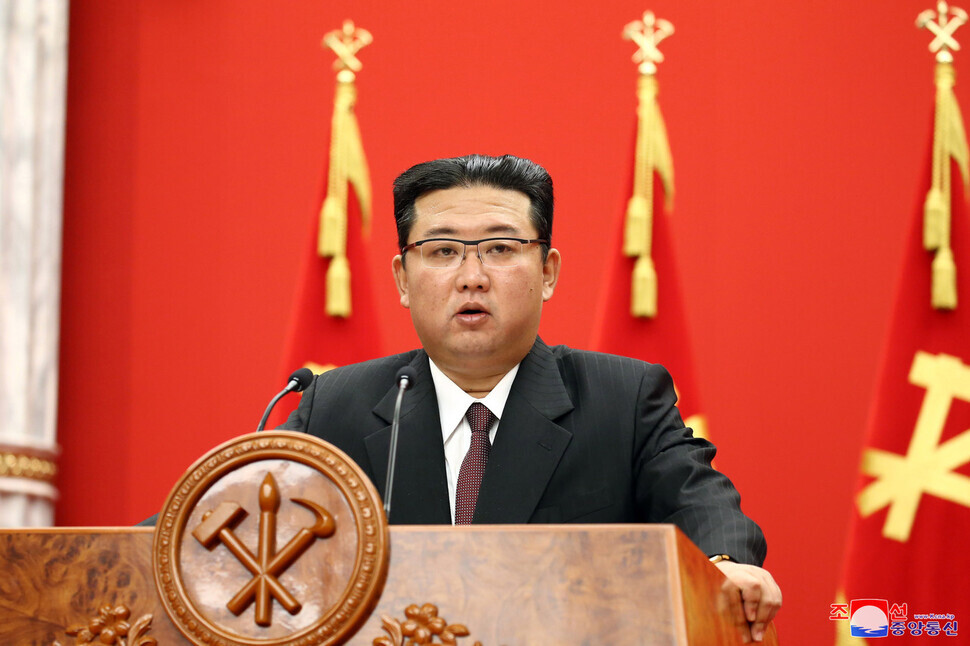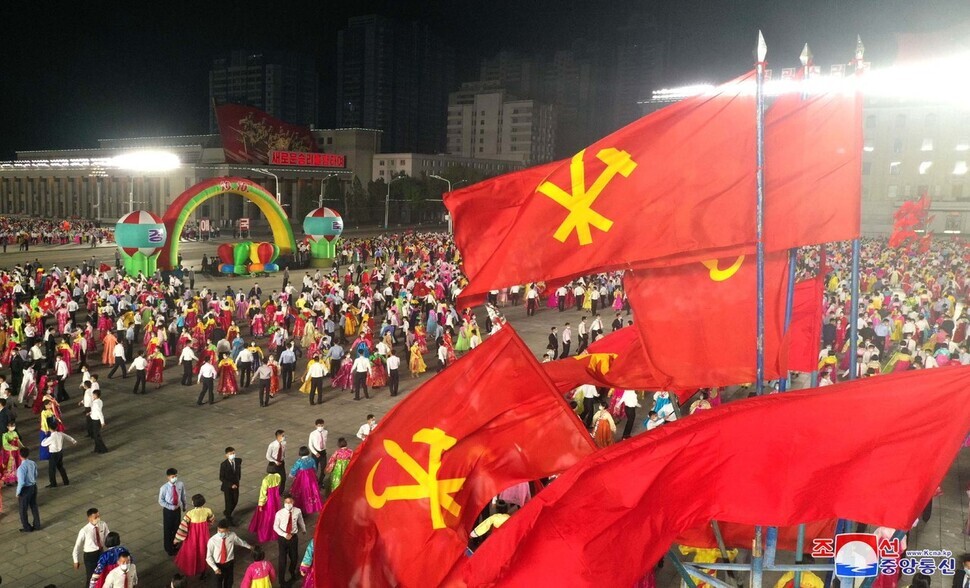hankyoreh
Links to other country sites 다른 나라 사이트 링크
N. Korea marks 76th anniversary of ruling party’s founding without military show

The 76th anniversary of the founding of the Workers’ Party of Korea (WPK) passed “quietly and uneventfully” on Sunday, amid close attention by the South Korean government to possible strategic military activity by North Korea.
There was no military parade with a large-scale display of troops and weapons, nor did the North attempt any intermediate-range ballistic missile or short-range missile launches. A speech by leader Kim Jong-un was focused on the domestic political situation, with an emphasis on “solving the people's food, clothing and housing problems.”
The very fact that the WPK anniversary was commemorated without a show of military force can be seen as a positive signal toward Seoul and Washington.
It means that the minimum conditions are in place for additional actions by South and North Korean authorities beyond the restoration of the inter-Korean direct hotlines on Oct. 4 — which came not long after South Korean President Moon Jae-in’s UN General Assembly speech on Sept. 21 proposing for a three- or four-party declaration official ending the Korean War, as well as a Sept. 29 policy speech by Kim before the Supreme People’s Assembly.
In a “lecture to commemorate the 76th founding anniversary of the WPK” held at the party’s Central Committee headquarters on Sunday, Kim placed his emphasis squarely on the North Korean people, stressing that “the people-first principle has definitely converted into the Party climate, state customs and social traits.”
On Monday, North Korea’s Rodong Sinmun newspaper devoted its front and second pages to a report on the event, where it described Kim as having “clarified again the determination and will of our Party to make the period of five-year plan set forth at the 8th Congress of the Party the efficient five years in boosting the national economy and solving the people's food, clothing and housing problems.”
The report also quoted Kim as saying, “President Kim Il Sung's autographic proposition [. . .] indicating that Party and state work which is apart from people and does not rely on people are meaningless, is a great one of eternal value as it intensively enshrines the immutable guideline and principle consistently maintained in our Party building and activities.”
Kim was further reported as saying, “[O]ur Party which serves the people can never tolerate the acts of infringing upon the interests of the people and divorcing the Party from the popular masses.”
The report referred to Kim’s “analysis of the subjective and objective environment of our revolution facing the unprecedented difficulties,” with the leader quoted as saying that “ideology is the most powerful and unique weapon for our revolution which has to [. . .] accomplish the great cause of building a powerful and prosperous country with its own efforts.”
“[S]ocialism is what keeps us alive and it represents our life and future,” he was quoted as saying.
Notably, the summary of Kim’s speech published in the Rodong Sinmun — which ran to over 4,500 words in English translation — included no content regarding South Korea or the US and no mention of the words “nuclear” or “deterrent.”
Combined with the lack of any North Korean military activity around the WPK anniversary, the fact that Kim highlighted the “brilliant achievements made in our Party building for the last ten years” without mentioning military achievements such as nuclear weapon and intercontinental ballistic missile development was read as a meaningful sign aimed at South Korea and the US.

Indeed, the South Korean government has maintained a cautious approach in the wake of two National Security Council standing committee meetings on Sept. 30 and Thursday, which came after Kim’s policy speech and its positive signal to Seoul. Since then, it has been indirectly encouraging Pyongyang to refrain from military activities, stressing the “vital importance” of “not creating military tensions” and “keeping the Korean Peninsula situation on a stable footing.”
The signals it sent to the North were based on an assessment of the situation, which a senior administration official described as “conditions that make it difficult to rest easy until we’ve gotten past the WPK anniversary without incident.”
Now that the anniversary has passed quietly and uneventfully, some are predicting — or perhaps simply hoping — that the South Korean government will be more proactive with the North than its current circumspect approach.
By Lee Je-hun, senior staff writer
Please direct questions or comments to [english@hani.co.kr]

Editorial・opinion
![[Column] Park Geun-hye déjà vu in Yoon Suk-yeol [Column] Park Geun-hye déjà vu in Yoon Suk-yeol](https://flexible.img.hani.co.kr/flexible/normal/500/300/imgdb/original/2024/0424/651713945113788.jpg) [Column] Park Geun-hye déjà vu in Yoon Suk-yeol
[Column] Park Geun-hye déjà vu in Yoon Suk-yeol![[Editorial] New weight of N. Korea’s nuclear threats makes dialogue all the more urgent [Editorial] New weight of N. Korea’s nuclear threats makes dialogue all the more urgent](https://flexible.img.hani.co.kr/flexible/normal/500/300/imgdb/original/2024/0424/7317139454662664.jpg) [Editorial] New weight of N. Korea’s nuclear threats makes dialogue all the more urgent
[Editorial] New weight of N. Korea’s nuclear threats makes dialogue all the more urgent- [Guest essay] The real reason Korea’s new right wants to dub Rhee a founding father
- [Column] ‘Choson’: Is it time we start referring to N. Korea in its own terms?
- [Editorial] Japan’s rewriting of history with Korea has gone too far
- [Column] The president’s questionable capacity for dialogue
- [Column] Are chaebol firms just pizza pies for families to divvy up as they please?
- [Column] Has Korea, too, crossed the Rubicon on China?
- [Correspondent’s column] In Japan’s alliance with US, echoes of its past alliances with UK
- [Editorial] Does Yoon think the Korean public is wrong?
Most viewed articles
- 1‘We must say no’: Seoul defense chief on Korean, USFK involvement in hypothetical Taiwan crisis
- 2N. Korean delegation’s trip to Iran shows how Pyongyang is leveraging ties with Moscow
- 346% of cases of violence against women in Korea perpetrated by intimate partner, study finds
- 4[Column] Park Geun-hye déjà vu in Yoon Suk-yeol
- 5‘Weddingflation’ breaks the bank for Korean couples-to-be
- 6Will NewJeans end up collateral damage in internal feud at K-pop juggernaut Hybe?
- 7Amnesty notes ‘erosion’ of freedom of expression in Korea in annual human rights report
- 8[Interview] Dear Korean men, It’s OK to admit you’re not always strong
- 9Korean government’s compromise plan for medical reform swiftly rejected by doctors
- 10[Editorial] Japan’s rewriting of history with Korea has gone too far